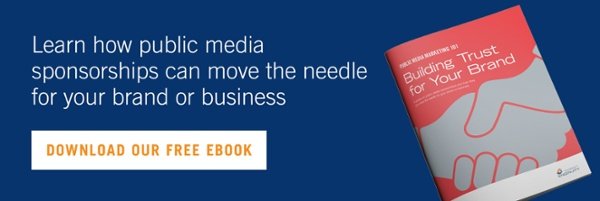3 Reasons Why University Graduate Programs Sponsor Public Media
Why do prestigious universities sponsor public media to attract graduate students?
Take a look at this list: American University, Arizona State University, Drexel University, Georgetown University, Loyola Marymount University, UCLA, University of Notre Dame, USC. All of them are either running grad school enrollment campaigns on public media today or have run them recently (within the past two years).
To understand why, I reached out to several public media marketing and sponsorship professionals. Based upon conversations with them, there are three clear takeaways.
1. Public Media Reaches Ideal Grad Students
“Public radio stations deliver candidates,” says Karen Rudolph, marketing manager with Market Enginuity, a sponsorship sales organization partnering with public radio stations across the country. “The annual NPR audience survey done by MRI-Simmons shows public radio listeners have a higher propensity than the average adult to view their work as a career rather than just a job, work in a professional sector, and crucial for graduate schools, have a bachelor’s degree.
Brian O’Donnell, national account manager for WAMU in Washington, D.C., who has worked with the Thunderbird School of Management at Arizona State University adds, “On a basic level, graduate schools recruit college graduates, and the throughline for NPR audiences across markets is educational attainment.”
Another WAMU account executive, Robin Johnson, who has sold campaigns to Georgetown University, views it similarly. “Universities target the demographics our station reaches,” she says. “Affluent, college-educated individuals who are interested in getting an advanced degree.”
Affluent is right. The NPR audience survey cited above shows public radio listeners 18 and older are more than twice as likely to earn an individual income of $100,000 or more when compared with the average adult. High earners can more easily afford grad school tuition, or perhaps secure educational loans.
2. Public Radio Listeners Over-Index On Key Values
“The NPR listener values education,” says WAMU National Account Manager Amanda Harris, who has Drexel University as a client. “Our audience listens every day to stay on top of the issues impacting the world at large and their community. It is a perfect match for universities to reach the intellectually curious evangelists for education.”
At KCRW in Los Angeles, Senior Account Director Anita Rao Keech adds, “UCLA was looking to reach a certain slice of educated, smart, creative thinkers but they wanted to broaden the type of person that usually comes to the Anderson School of Management.
“They mentioned a few times it had to be someone who would be environmentally leaning and someone who cared about the stakeholders within a business community they wanted to work in so that everyone wins, not just the Board. Very different angle from a traditional business school.”
That NPR audience study mentioned above? Well, it also reveals how public radio listeners over-index for values like social responsibility (by 22%), being well educated (by 15%), and preserving the environment (by 27%). Therefore, it’s easy to see why UCLA saw KCRW as a strategic media partner.
But let’s not forget about ambition. Insider Higher Ed writes that “nearly 90 percent of those returning to college are seeking to enhance their career prospects and earning power.”
Gee Padilla, also a senior account director at KCRW who works with Loyola Marymount University, attests to that, saying, “Local universities sponsor our station to connect with individuals who care about education and are looking to advance their careers.”
3. Public Media's Halo Effect Benefits Brands
As appealing as public media fans are to university marketers due to their educational attainment and personal values, grad schools also benefit from the affiliation and affirmation that results from sponsoring an NPR station (aka the halo effect).
According to Jacobs Media Strategies, audience trust is a “key driver” of public radio’s success. A study they conducted revealed that nearly nine in ten listeners say they trust public radio.
That high level of trust means that the simple, spoken word underwriting messages listeners hear on their local NPR station are not just effective, they bring credibility to the corporate sponsors supporting the medium.
“By sponsoring a public media outlet, a university will likely reap the benefits of the halo effect,’ says Dareni Wellman, content marketer for Market Enginuity. “Prospective students form a positive association with the school's brand, making them more likely to trust its programs and offerings - even if they were never aware of them before.”
PUBLIC MEDIA SPONSORSHIP: “A WINNING PLATFORM”
University marketers should align their brands with media partners that will help them meet their marketing objectives at every stage of the customer journey. The right public media sponsorship strategy can be effective at both the awareness and consideration stages.
“Brand awareness is still fundamentally important,” Rudolph of Market Enginuity says. “Because 86% of listeners consider public radio personally important, sponsorship of their local station positions the university as an advocate for content they hold dear, starting off the relationship on the right foot.”
Harris at WAMU adds, “Sponsors empower our listeners to find new educational opportunities for themselves and share program information with their networks, helping prospective students find the right graduate program.”
It may come as a surprise to think about public radio sponsorship supporting middle-of-funnel marketing efforts. But according to the Radio Advertising Bureau radio marketing can drive Google search as much as 29%. Therefore, a public radio campaign effectively complements digital marketing tactics like local SEO and paid search.
Perhaps WAMU’s O’Donnell sums it up best. “The general credibility and gravitas associated with public radio sponsorship, combined with reaching the right audience, gives schools a winning platform.”
Whether you’re interested in sponsoring one of our public media stations or learning more about turnkey sponsorship representation for your station, we can help. Complete the form, and we’ll be in touch soon.
Subscribe
Every week we share insights, industry news or best practices on public media sponsorship. Receive a weekly digest of our latest blog posts so you’re always in the know.
